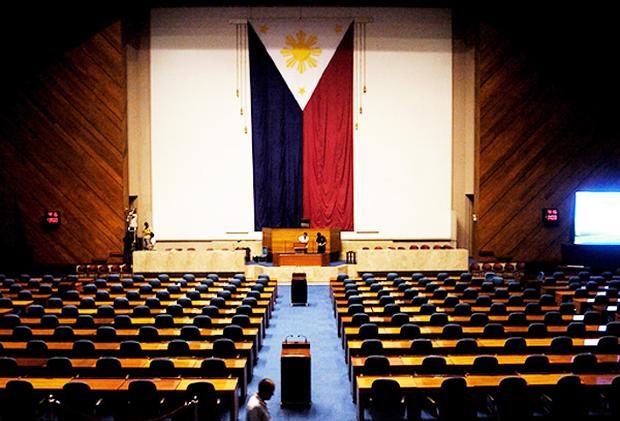
FILE PHOTO: The plenary hall of the House of Representatives. (Philippine Daily Inquirer)
MANILA, Philippines — A debate arose in the House of Representatives about whether or not farmers should be permitted to eventually transfer ownership of property given to them by the government during discussions of proposals aiming to condone the debts of farmer-beneficiaries in respect to the land.
On Wednesday, Albay 1st District Rep. Edcel Lagman inquired if the substitute law would still allow farmers to transfer the Comprehensive Agrarian Reform Program (CARP)-acquired land after 10 years.
According to the proposals, agrarian reform beneficiaries would get their pending debt or payments forgiven, but they would not be able to transfer them for 10 years. ARBs would control their land after 10 years, which Lagman said would hinder agricultural reform.
In response, Albay 2nd District Rep. Joey Salceda, one of the authors of the bill, said the provision is being taken out but it is still subject to Department of Agrarian Reform (DAR) approval.
But Lagman said that since the policy would come from the House, the issue should be resolved by lawmakers.
“I think we should be the one to make the law on this non-transferability, and I would suppose that 10 years is too short a time. As a matter of fact, 10 years had already elapsed as to many beneficiaries, and if we follow the provisions of the law, then these lands would already be transferable,” he said.
According to Lagman, he is proposing the non-transferable clause should be increased to 30 years to protect ARBs from third parties who are interested in taking the land. Should farmers take up loans from banks, what should be used as collateral or a mortgage is the product of the land, but not the land itself?
Should the farmer yield the land provided through CARP, it should be given to the government so that the state can give it to another deserving ARB, and not to private companies, he said.
“I would suggest a longer period and that also, lands covered by the Agrarian Reform Law should not be subject to mortgages. What should be mortgaged should be the products of the land, but not the land itself, because once the farmer fails to pay the mortgage or indebtedness, that would be the end of agrarian reform with respect to the farmers,” he added.
But Abono party-list Rep. Robert Raymund Estrella said that Lagman’s suggestions would mean that farmers still do not have full ownership of the land.
“If we — to my mind — say we are actually giving emancipation or freedom of the farmers, therefore also giving them absolute ownership of their land. Absolute ownership in my own opinion is that you can do whatever you want to with the land,” Estrella said.
“Ang (The) absolute proof of ownership of something is you can sell it, you can use it as collateral, and transfer it to whoever you want, probably your children, your cousin, or somebody else. Pero kapag meron hong collatilla na hindi mo pwedeng galawin ‘yon, hindi na naman iyo ‘yong lupa […] it’s like being pregnant, either you’re pregnant or not at all, you cannot be half-pregnant,” he added.
(But if you have this collatilla that you cannot transfer, it seems that the land is not yours.)
Lagman then reminded the House panel that the bill being proposed is social legislation, aiming to protect the farmers not only from the debt but also from future dangers like losing land which is their source of income.
“Agrarian reform is a social legislation, and we would like to protect the farmers not only today, not only tomorrow, but also years after the land has been awarded to them. Yes, we give freedom to the farmers, but we are not giving them [the] freedom to lose their lands through the forfeiture of mortgages or indebtedness in subsequent years,” he said.
Estrella then raised another point, noting that the government has failed to give farmers the much-needed financial assistance to raise capital — which leads to farmers selling or loaning their land.
In the end, Lagman said he sticks with his point but that he is willing to adhere to the decision of the committee. However, he noted that he would still pursue the issue during the plenary discussions on the bill.
On his birthday last September 13, President Ferdinand Marcos Jr. issued an order freezing the payment of CARP amortization. According to DAR Secretary Conrado Estrella III, the Chief Executive’s decision is the first step towards preparing for the promise of condoning all outstanding loans of ARBs.
READ: Marcos freezes Carp amortization for one year
Salceda said during the hearing that condoning the outstanding debts of ARBs would cost the government P58 billion in terms of principal payments. The chair of the House committee on ways and means, however, said that they have yet to compute the tax dues that would be condoned by the government if the bill is passed.
READ: Marcos to order one-year moratorium on land amortization for farmers